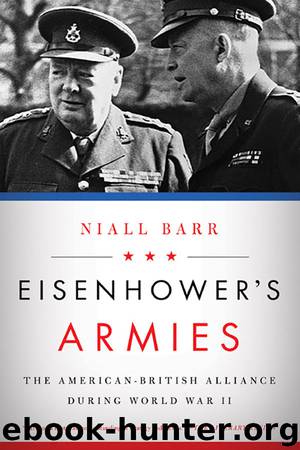Eisenhower's Armies: The American-British Alliance during World War II by Niall Barr

Author:Niall Barr [Barr, Niall]
Language: eng
Format: epub, azw
Publisher: Pegasus
Published: 2015-12-14T23:00:00+00:00
While Baytown appeared a relatively straightforward operation, Eisenhower always recognised that not only was Avalanche a more risky venture but that the US Fifth Army was something of an unknown quantity. It had been established in January 1943 under the command of Lieutenant General Mark Clark, a relatively young American officer who had received meteoric promotion, leapfrogging ahead of many older, more experienced officers. He had served briefly as an infantry company commander in the Argonne in 1918, but had really come to prominence in 1940 when he became General MacNair’s right-hand man at GHQ Army Ground Forces, developing the ‘mass production’ methods for training the new US Army.6 Eisenhower considered Clark to have ‘no superior’ in the fields of ‘organization and training’, a view shared by Marshall, who consistently supported him in his rapid promotion.7 Clark had been given command of the US II Corps in England while also serving as Eisenhower’s deputy commander in London during 1942, where he had impressed Churchill as just the kind of pugnacious and dynamic commander favoured by the British Prime Minister. Churchill insisted thereafter on referring to Clark as ‘the Eagle’, in reference to his aquiline features and hawkish attitude. Clark had then been involved in the cloak-and-dagger attempt to secure French support in North Africa before the Torch landings, for which he was awarded the Congressional Medal of Honor. There was no question that his star was in the ascendant, and when Eisenhower offered him the command of the Fifth Army, even though it was initially a replacement and training organisation, Clark jumped at the chance.
While Clark had many of the essential attributes for an army commander in his ambition, his organisational ability and his relentless and ruthless pursuit of objectives, these were combined with less attractive characteristics. He was a vain man, anxious and almost aggressive in his desire for publicity, yet highly sensitive to any criticism, whether real or perceived. He had to fret on the sidelines in relative inactivity during the Tunisian and Sicilian campaigns as the Fifth Army were not directly involved, but he was well aware of the rumours of British dominance and the biased publicity that surrounded them. From the first, he was determined to prove the superiority of American troops and to ensure that they received adequate recognition for their achievements. Even before his army went into combat, he had begun to see the British as rivals and competitors rather than allies.
Clark assembled a strong staff in the Fifth Army. Most people who came to know him considered Al Gruenther to be one of the finest chiefs of staff of the war. Brigadier Charles Richardson, who had served with distinction on Montgomery’s staff, joined with a small team to help coordinate the British forces within the army. He considered that Gruenther ‘had a brilliant mind and was completely devoid of intellectual arrogance’ while also being totally unbiased towards either the British or American forces in the army.8 Clark also possessed a talented head of G3 (Operations) in the form of Brigadier General Don Brann, a contemporary of Eisenhower.
Download
Eisenhower's Armies: The American-British Alliance during World War II by Niall Barr.azw
This site does not store any files on its server. We only index and link to content provided by other sites. Please contact the content providers to delete copyright contents if any and email us, we'll remove relevant links or contents immediately.
| Arms Control | Diplomacy |
| Security | Trades & Tariffs |
| Treaties | African |
| Asian | Australian & Oceanian |
| Canadian | Caribbean & Latin American |
| European | Middle Eastern |
| Russian & Former Soviet Union |
The Secret History by Donna Tartt(16618)
The Social Justice Warrior Handbook by Lisa De Pasquale(11489)
Thirteen Reasons Why by Jay Asher(7786)
This Is How You Lose Her by Junot Diaz(5768)
Weapons of Math Destruction by Cathy O'Neil(5034)
Zero to One by Peter Thiel(4823)
The Myth of the Strong Leader by Archie Brown(4789)
Promise Me, Dad by Joe Biden(4444)
Stone's Rules by Roger Stone(4415)
Beartown by Fredrik Backman(4413)
How Democracies Die by Steven Levitsky & Daniel Ziblatt(4397)
The Fire Next Time by James Baldwin(4341)
100 Deadly Skills by Clint Emerson(4076)
A Higher Loyalty: Truth, Lies, and Leadership by James Comey(4031)
Rise and Kill First by Ronen Bergman(4012)
The David Icke Guide to the Global Conspiracy (and how to end it) by David Icke(3881)
The Farm by Tom Rob Smith(3871)
Secrecy World by Jake Bernstein(3782)
The Doomsday Machine by Daniel Ellsberg(3730)
